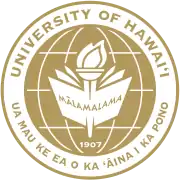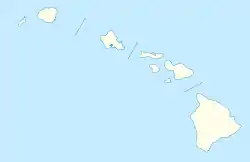University of Hawaiʻi
The University of Hawaiʻi System, formally the University of Hawaiʻi and popularly known as UH, is a public college and university system that confers associate, bachelor's, master's, and doctoral degrees through three universities, seven community colleges, an employment training center, three university centers, four education centers and various other research facilities distributed across six islands throughout the state of Hawaii in the United States. All schools of the University of Hawaiʻi system are accredited by the Western Association of Schools and Colleges. The UH system's main administrative offices are located on the property of the University of Hawaiʻi at Mānoa in Honolulu CDP.[4][5][6]
 | |
| Motto | Maluna aʻe o nā lāhui āpau ke ola ke kānaka (Hawaiian)[1] |
|---|---|
Motto in English | "Above all nations is humanity" |
| Type | Public university system |
| Established | 1907 |
Academic affiliations |
|
| Endowment | $341.7 million (2020)[2] |
| President | David Lassner |
| Students | 50,310 |
| Location | , , United States |
| Campus | 3 universities, 7 community colleges, 5 research centers, 3 university centers, 4 education centers |
| Colors | Green and black[3] |
| Website | www |
 | |

History
The present-day University of Hawai'i System was created in 1965 which combined the State of Hawai'i's technical and community colleges under one system within the former University of Hawai'i.
Former University of Hawai'i
The University of Hawai'i was created by the Territory of Hawai'i in 1907 as a land-grant college of agriculture and mechanical arts and held its first classes in 1907. In 1912 it moved to its present location in Mānoa Valley and being renamed College of Hawaii. In 1919 the College of Hawai'i obtained university status by the Hawai'i Territorial Legislature and was renamed the University of Hawai'i.
In 1965, the state legislature created a system of community colleges and placed it within the university. The university was renamed the University of Hawai'i at Mānoa to distinguish it from other campuses in the University of Hawai'i System in 1972.
Colleges and universities
The University of Hawaiʻi at Mānoa is the flagship institution of the University of Hawaiʻi system. It was founded as a land-grant college under the terms of the Morrill Acts of 1862 and 1890. Programs include Hawaiian/Pacific Studies, Astronomy, East Asian Languages and Literature, Asian Studies, Comparative Philosophy, Marine Science, Second Language Studies, along with Botany, Engineering, Ethnomusicology, Geophysics, Law, Business, Linguistics, Mathematics, and Medicine.
The second-largest institution is the University of Hawaiʻi at Hilo on the "Big Island" of Hawaiʻi, with over 3,000 students. The University of Hawaiʻi-West Oʻahu in Kapolei primarily serves students who reside in Honolulu's western and central suburban communities.
The University of Hawaiʻi Community College System comprises four community colleges island campuses on O'ahu and one each on Maui, Kauaʻi, and Hawaii. The colleges were created to improve accessibility of courses to more Hawaiʻi residents and provide an affordable means of easing the transition from secondary school/high school to college for many students. University of Hawaiʻi education centers are located in more remote areas of the State and its several islands, supporting rural communities via distance education.
Universities
- University of Hawaiʻi at Mānoa
- University of Hawaiʻi at Hilo
- University of Hawaiʻi, West Oʻahu
Colleges
- University of Hawaiʻi Maui College
Community colleges
- Hawaiʻi Community College in Hilo
- Hawaiʻi Community College in Kailua Kona
- Honolulu Community College
- Kapiʻolani Community College
- Kauaʻi Community College
- Leeward Community College
- Windward Community College
Professional schools
Research facilities
- Center for Philippine Studies
- Cancer Research Center of Hawaiʻi
- East-West Center
- Haleakalā Observatory
- Hawaiʻi Natural Energy Institute
- Institute for Astronomy
- Institute of Geophysics and Planetology
- Institute of Marine Biology
- Lyon Arboretum
- Mauna Kea Observatory
- W. M. Keck Observatory
- Waikīkī Aquarium
University centers
- University of Hawaiʻi Center West Hawaiʻi
- University of Hawaiʻi Center Kauaʻi
- University of Hawaiʻi Center Maui
Education centers
- Molokaʻi Education Center
- Lānaʻi Education Center
- Hāna Education Center
- Waiʻanae Education Center
- Lāhainā Education Center
Board of Regents
In accordance with Article X, Section 6 of the Hawaiʻi State Constitution, the University of Hawaiʻi is governed by a Board of Regents, composed of 15 unpaid members who are nominated by a Regents Candidate Advisory Council, appointed by the governor, and confirmed by the state legislature. The board oversees all aspects of governance for the university system, including its internal structure and management. The board also appoints, evaluates, and if necessary removes the president of the University of Hawaiʻi.[9]
Student regents
The university's governing board includes a current student appointed by the governor of Hawaiʻi to serve a two-year term as a full voting regent. The practice of appointing a student to the board was approved by the Hawaiʻi State Legislature in 1997.
Notable alumni
Alumni of the University of Hawaiʻi system include many notable persons in various walks of life. Senator Daniel Inouye and Tammy Duckworth both are veterans of the US military who were injured in the line of duty then later entered government service. Bette Midler and Georgia Engel are successful entertainers on the national stage. Composer Hsiung-Zee Wong also attended the University of Hawai'i. President Barack Obama's parents, Barack Obama Sr. and Ann Dunham, and half-sister, Maya Soetoro-Ng, also earned degrees from the Mānoa campus, where his parents met in a Russian language class. His mother earned three degrees from the University of Hawaiʻi including a PhD in anthropology.
Mazie Hirono is a current U.S. senator. She graduated from the University of Hawaii with a BA in Psychology. She is the first elected female senator from Hawaii, the first Asian-American woman elected to the Senate, the first U.S. senator born in Japan, and the nation's first Buddhist senator.
Alice Augusta Ball was not only the first woman to graduate from the College of Hawaiʻi (now the University of Hawaiʻi) in 1915, but was also the first African American research chemist and instructor in the college's chemistry department. In addition, she was the first person to successfully develop a water-soluble form of chaulmoogra oil that was used for decades to relieve the symptoms of Hansen's disease (leprosy).[10]
Notable faculty
The University of Hawaiʻi system has had many faculty members of note. Many were visiting faculty or came after they won major awards like Nobel Laureate Georg von Békésy. Ryuzo Yanagimachi, principal investigator of the research group that developed a method of cloning from adult animal cells, is still on the faculty.
In July 2019, Bob Huey, a professor of Japanese literature in the Department of East Asian Languages and Literatures, was presented the Order of the Rising Sun, Gold Rays with Neck Ribbon, one of Japan's highest honors for those without Japanese citizenship.[11]
Further reading
- Robert, Kamins (1998). Mālamalama: A History of the University of Hawaiʻi.
- David, Yount (1996). Who Runs The University? The Politics of Higher Education In Hawaiʻi, 1985-1992.
References
- Otsubo Monument Works Archived 2020-07-02 at the Wayback Machine, National Register of Historic Places Registration Form, DLNR, p. 85
- As of June 30, 2020. U.S. and Canadian Institutions Listed by Fiscal Year 2020 Endowment Market Value and Change in Endowment Market Value from FY19 to FY20 (Report). National Association of College and University Business Officers and TIAA. February 19, 2021. Archived from the original on February 21, 2021. Retrieved February 20, 2021.
- "Graphic standards" (PDF). www.hawaii.edu. Archived (PDF) from the original on 2020-08-23. Retrieved 2019-11-30.
- Magin, Janis L. (July 1, 2007). "Land deals could breathe new life into Mōʻiliʻili". American City Business Journals. Archived from the original on March 23, 2021. Retrieved April 18, 2021.
Dobelle at that time had even suggested moving the University of Hawaiʻi system offices from the Mānoa campus to office space in Mōʻiliʻili, something the current administration is not actively considering.
- "Office of the President Archived 2013-07-04 at the Wayback Machine". University of Hawaiʻi System. Retrieved on October 5, 2011. "Office of the President; 2444 Dole Street; 202 Bachman Hall; Honolulu, Hawaii 96822"
- "Office of the Board of Regents Archived 2013-07-08 at the Wayback Machine". University of Hawaiʻi System. Retrieved on October 5, 2011. "Executive Administrator and Secretary of the Board of Regents; 2444 Dole Street; Room 209, Bachman Hall; Honolulu, Hawaii 96822"
- "Welcome | The Daniel K. Inouye College of Pharmacy". pharmacy.uhh.hawaii.edu. Archived from the original on 2019-11-21. Retrieved 2019-11-30.
- "University of Hawaii - Ocean Engineering & Law Education". EduMaritime.net. Archived from the original on 2013-12-11. Retrieved 2018-10-24.
- "Description of Duties of the Board of Regents of the University of Hawaiʻi". 9 August 2007. Archived from the original on 16 October 2013. Retrieved 14 September 2013.
- "ScholarSpace at University of Hawaii at Manoa: Ball, Alice Augusta". scholarspace.manoa.hawaii.edu. Archived from the original on 2019-06-08. Retrieved 2019-06-16.
- UH News (10 July 2019). "Japan grants high honor to UH professor". University of Hawai'i News. Archived from the original on 10 June 2020. Retrieved 13 July 2019.